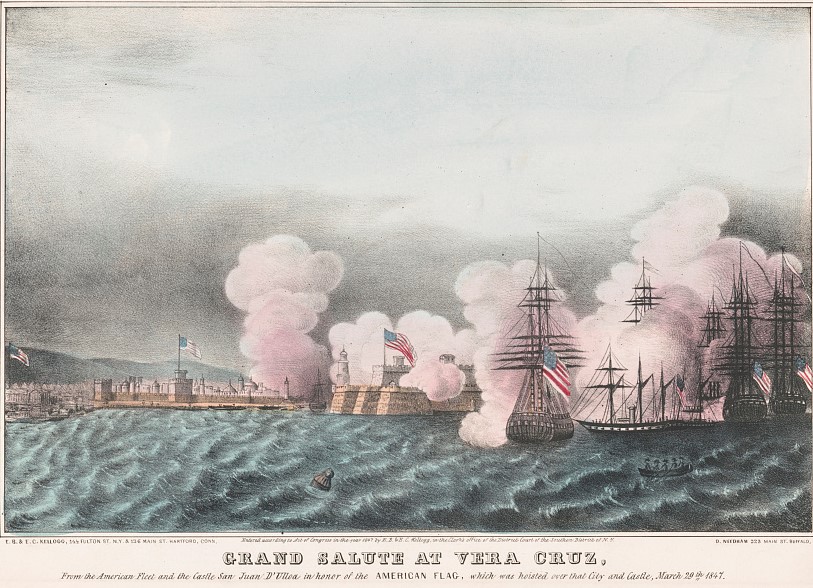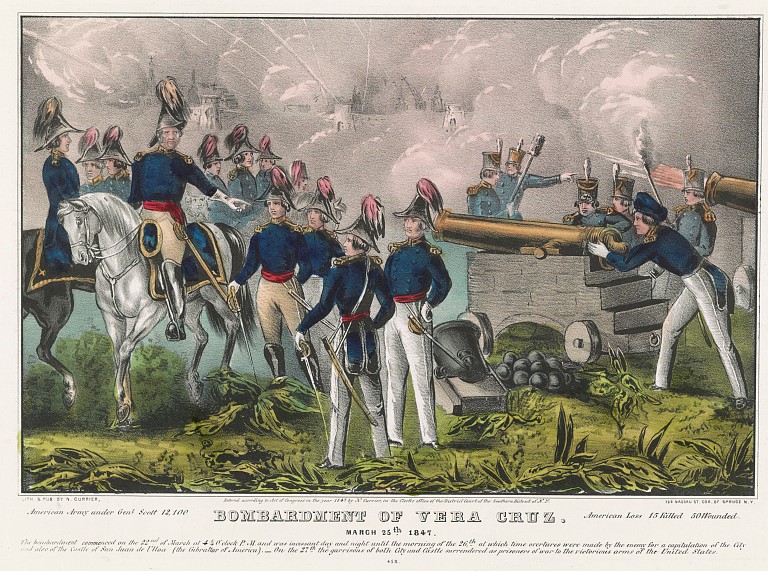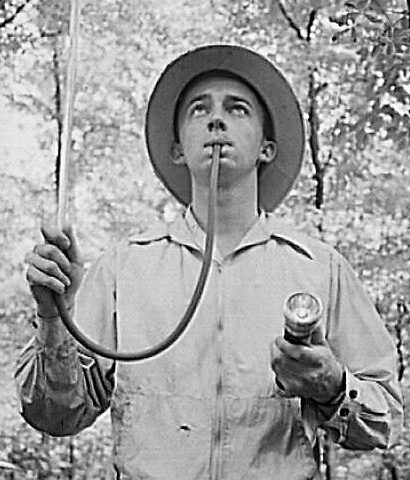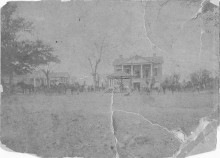MEXICAN WAR REMINISCENCES
Part IV
By Judge Zo. S. Cook
(These several contributions cover the period of February to April, 1897, and were made to the Wilcox Progressive Era, published at Camden)
Article 4
Our first night on shore was the first intimation of what the life of a soldier meant, A storm or gale was mentioned in a preceding article; this extended into the night, tents could not be set up, blown down as fast as they were attempted to be fixed, Cooking had to be done if there was to be any eating, The camp was in the sand hills, and no sooner would a man lie down than the sand would gather around him till he would be lost to view.
Sand on cook vessels, sand on provisions, sand in eyes, hair, mouth, clothes, nothing but sand. The boys had been packed on board of the vessel for a week, and none but those recovering from an attack of seasickness can know what it is to have an appetite and be hungry. The orders were very strict against straggling, and necessarily so, because we were in the enemy’s country and liable to be killed any moment by strolling Mexicans, if caught away from the command.
Dead Mules
Another not very appetizing condition; this had been a camping ground from the fall of Vera Cruz. Many heroes and mules had died on the ground and not a carcass had been -removed; there seemed to be dead mules without number. The camp had to be made in regular army regulation order. If a tent happened to cover the last resting place of one of Uncle Sam’s departed mules, there it must be pitched, there the occupants must sleep. Eat we must and eat we did, notwithstanding the drawbacks, in fact we very soon learned that the small matter of a dead mule didn’t interfere with our appetites.
San Juan
From the camp we marched about eighteen miles out on the road to the National Bridge, where a big battle had just before been fought by our troops on the march to the City of Mexico. The camp was called San Juan (we called it San Wan). It was situated on a beautiful clear water creek bearing the name of the camp. This was a camp of instructions for new recruits. We were drilled to the utmost capacity of physical endurance. We were required also to furnish guards to move trains of army stores. A guard would take a train a day’s march when it met another guard, and so on. The wagon trains passed from the coast to the interior.
Our life at this time was extremely monotonous. The monotony was occasionally broken by the passing or coming to the camping ground of a train of pack mules, going to and from the coast with produce and merchandise. These caravans belonged to Mexican merchants living in the interior towns. Here they would gather up in large quantities poultry, eggs, hides, fruits, syrup, aqua diente, the meanest liquor that was ever discovered. This produce was sold in Vera Cruz and the return cargo consisted of various wares and articles destined for sale in the interior. One of these caravans arriving at camp was hailed with pleasure, particularly by those having money to spend.
Many articles of diet could be bought, such as eggs, chickens, honey, and last, but not least by any means, the abominable drink mentioned. But traffic in this was soon checked. Col Seibles passed a prohibition law now existing in our county. Honey was much sought after till it was found out the kind of vessels in which it was carried, This was raw cowhide, sewed up so as to form a square bag, the hair inside. After seeing this, the trade on honey declined rapidly. Eggs went as fast as they could be counted at fifty cents a dozen; turkey eggs sold as rapidly till it was found out that another name ought to have been added to the fowl that laid them; they were really turkey-buzzard eggs.
This same camping place has a spot of ground not far off to which all dead animals were carried, the ground was covered with buzzard eggs, but none thought of it at the time. In fact, but few had ever been near the dumping place for dead animals; then no turkey eggs were offered for sale as long as chicken or guinea eggs lasted. They were probably just as good, so long as it was not known. After this, it was dangerous for a Mexican to offer turkey eggs for sale in that camp.
Lemonade was a favorite
Limes grew in great abundance on the creeks, bushels could be gathered within a few hundred yards of the camp. The boys used up all their rations of sugar making lemonade, thus having to drink their coffee straight. There was heardly an exception in this; the love of lemonade was so great sugar was stolen from each other and from the commissary stores every chance that was given. One soldier from our company, Warren Quartermass, was on guard at the door of the commissary one night and was caught asleep on his post. The corporal of the guard reported him. He was court-martialled, found guilty and sentenced to carry one hundred pounds of rock on his shoulders daily for three months, two hours on and two hours off. The boys in our company were very indignant with the corporal for reporting him, the post was inside the lines, was a stationary one, had to sit on a barrel or stand up all the time. It was a post more dreaded than any, nor was he the only one found thus failing to do his duty, but the others were not reported. It seemed cruel to do so. Many of the men were sick at this camp from change of water and climate as well as diet and habits of life.
Strange Animal
A strange animal was killed; this was a kind of lizzard or high land alligator. The one killed was about two and a half feet long, shaped like a common lizzard except that it had something resembling bristles along the spine some three inches long, flat and sharp at the points. It was more of a horny nature than otherwise. These bristles, or whatever they may be, could be raised at will, giving the reptile an ugly and formidable appearance. They were, however, harmless. Several armadillos were killed, as also a porcupine. All animal named are common to that country but never seen here except in a show.
General Santa Anna
While the command was stationed here, an exciting event transpired; this was the passing of General Santa Anna, a prisoner of war, to the coast of embarkation to Cuba or some other country. Every soldier wanted to see the noted man. One member of Capt. Irby’s company named Wilson High, from Selma, had a brother butchered at the Alamo in Texas by this cruel hearted man, Santa Anna. High became desperate at the thought of seeing the man who had so cruelly treated the Texans, and swore that he would kill him on sight even if he knew he would be killed himself the next minute. High was not the only one in the little command who had relations in that memorable engagement.
The feeling was so strong, and the men so loud and outspoken as to their intentions that word went to the escort of Santa Anna to go around the camp, which was done. A few cavalry appeared at camp, where they bivouaced for the night intimating that the escort would be along the next day. The object of their hatred was, at the time, spending the night at the castle mentioned. The next morning, they, with the noted prisoner, went to the coast some miles north of the city of Vera Cruz, where a boat was in waiting. He went aboard and rowed out to a vessel and thus ended this man’s career in Mexico for some years, He afterward returned, but this is a matter of history and needs no further notice as to this writing. No doubt an attempt would have been made to kill him had he passed our camp. This man swore a solemn oath that he intended to kill every Mexican he could lay his hands on, in revenge for the treatment to the Texans by the Mexican soldiery. It will be seen how faithfully he kept his oath before this narrative is closed.
SOURCE
The Alabama Historical Quarterly, Vol. 19, Nos. 03 & 04, Fall and Winter Issue 1957
A Collection of Biographies of ALABAMA REVOLUTIONARY WAR SOLDIERS Volume IV
This book is the 4th Volume in a series of books which includes genealogical and biographical information on some Revolutionary Soldiers who were in early Alabama and/or collected military pensions for their service. Some of their descendants still remain on the bounty land they received genealogical and biographical information on some Revolutionary Soldiers who were in early Alabama and/or collected military pensions for their service.
The soldiers in this volume include: ALSTON S. MASSEY; ELIAS MASSEY, JOHN C. GRAHAM, CALEB OWEN, SAMUEL GREGG, JOHN MCDOWELL, JOHN POOL, BARRETT BREWER, JOHN WATKINS BREEDLOVE, ISAAC BREWER, JOHN A. MCCUTCHEON, JR., THOMAS LOFTON, MOSES JOHNSON, ROBERT BARTLEY, NOEL BATTLES, JOHN BAXTER, HEZEKIAH BAYLES
A Collection of Biographies of ALABAMA REVOLUTIONARY WAR SOLDIERS Volume IV






